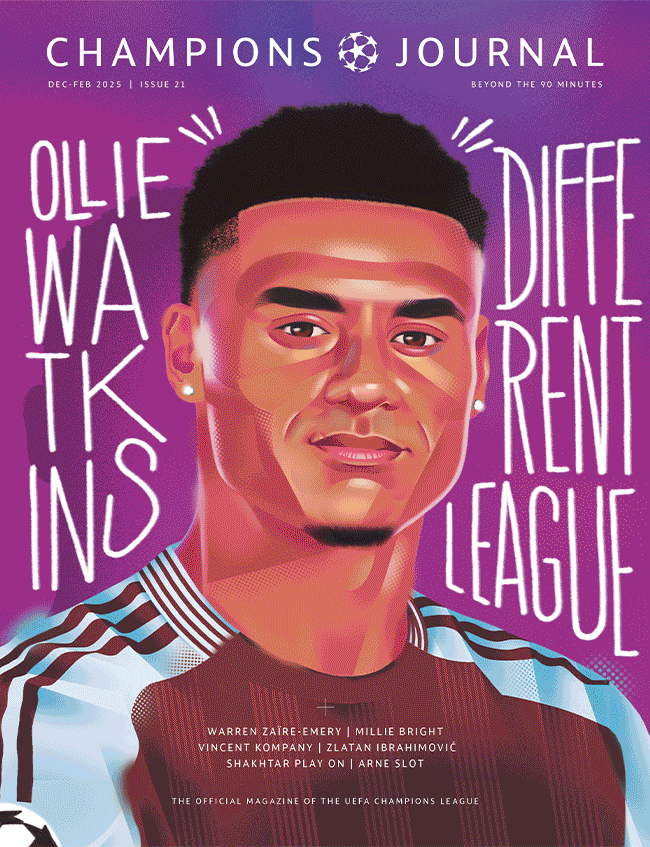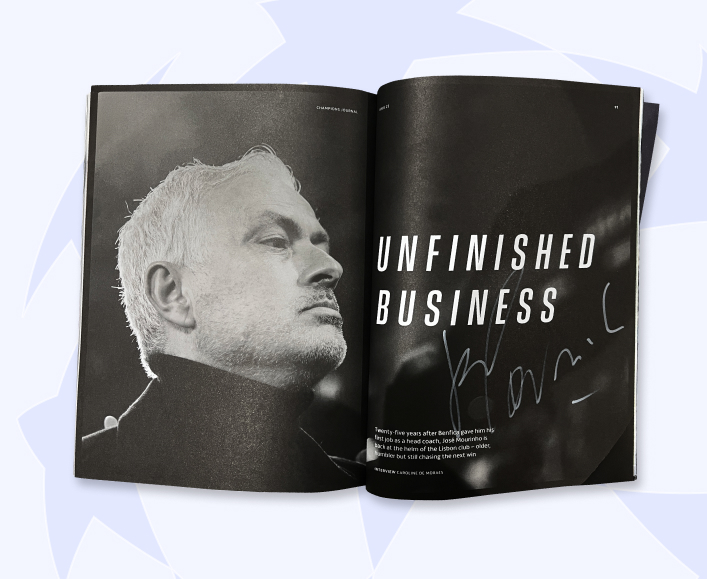It’s one of those debates that never goes out of fashion. No matter the era, no matter the changes sweeping through football. Always we must ask: how would Legendary Player X get on in the sleek, ultra-modern game of today? Today means 2025, though this could just as easily be a pub discussion in 2005. Or 1985. The names get updated, the hair gel comes and goes, but still we get no closer to an answer… And then along comes Khvicha Kvaratskhelia, like a time traveller from another century, stepping out of a black and white TV and asking what year this is.
Do not adjust your TV sets. The Kvaratskhelia show is among the most thrilling, throwback sights in contemporary football, a Jurassic Park where the original raptors were named George Best or Jimmy ‘Jinky’ Johnstone. As if spawned from the DNA of those fancy-footed wingers, Kvaratskhelia delights in causing mischief, seemingly playing the game at a quicker tempo than everyone else. Whether bamboozling a defender with feints and shimmies or embarrassing them at full pace, Kvaratskhelia has a bag of tricks he could have picked up at a vintage store – not just close control but wiry, natural balance, an elastic frame and a bold imagination. The prickly beard and low-rolled socks only add to the old-school charm.
Take his goal against Aston Villa in the Champions League quarter-finals. Paris Saint-Germain had pegged their visitors back to 1-1 at the Parc des Princes when Kvaratskhelia took charge of a counterattack. Sprinting down the left wing from close to the halfway line, the Georgian virtuoso cut inside on the edge of the box and shaped to shoot with his right foot, only to roll his boot over the ball and caress it back the other way. The sheer finesse sent Villa defender Axel Disasi into a tailspin, leaving Kvaratskhelia free to ghost behind him and hammer the ball just under the crossbar with his left foot – his supposedly weaker left foot. It didn’t look especially weak.
Speaking to Champions Journal ahead of Paris’ last-four showdown with Arsenal, Kvaratskhelia is rightly proud of that effort, which gave his team a lead they never relinquished. “I’ve scored some beautiful goals,” says the 24-year-old, flipping through a mental rolodex already stuffed with them. “I can’t say whether this one was better than the others. But when you’re aiming for the Champions League semi-finals and you score at such a crucial moment, at home, in front of your fans and for your team – that’s probably the most important, joyful and emotional goal I’ve scored. I was absolutely thrilled.”
Refreshingly, Kvaratskhelia says it out loud: thumping the ball past a keeper is as good as it gets. Forget the false modesty of claiming a neat pass to a team-mate is every bit as rewarding, though ‘Kvara’ has a knack for that too. He amassed 30 goals and 29 assists in 107 games for Napoli before joining Paris in January, yet one of those numbers just means more to him. “Scoring a goal is probably the most emotional moment – and, of course, the team’s victory,” he says. “I haven’t played in the final of a major tournament, so I can’t say for sure. But, for a footballer, scoring the goal, that moment – the split-second when the ball hits the back of the net – that’s something very few can truly understand unless they’ve experienced it themselves.”
It’s an experience he has enjoyed since climbing through the youth ranks at Dinamo Tbilisi. The club from the Georgian capital has a long tradition of encouraging players to express themselves, a quality identified as long ago as the 1960s by France Football magazine, which labelled Dinamo “the best eastern representatives of South American football traditions”. They were the free-flowing artists of the former Soviet Union, and winners of the European Cup Winners’ Cup in 1980/81 thanks to avant-garde talents such as Vitaly Daraselia and David Kipiani. That’s the maverick lineage that put the swivel in Kvaratskhelia’s hips – but the four-time Georgian Footballer of the Year, and the son of retired forward Badri Kvaratskhelia, was always destined for a bigger stage.
Khvicha’s quest to reach the highest level has now brought him to France itself. Leaving Napoli was no simple matter, however. The Partenopei snatched him up from Georgian outfit Dinamo Batumi in 2022 and launched him into the limelight, Kvaratskhelia helping Napoli win their first Serie A title for 33 years in his debut season, and earning the nickname ‘Kvaradona’ along the way – the fans sensing the spirit of Diego Maradona in his fearless extravagance. Moving halfway through the campaign made the process doubly tricky, but Kvaratskhelia felt compelled by Paris’ faith in him.
“There were offers from a lot of teams, but a very big factor was that PSG had shown interest the previous year as well,” he says. “Their desire for me to play for PSG was probably the biggest contributing factor. And when I saw that the team wanted me so much and had so much confidence in me, I decided to come here. Also, the fact that there are great footballers playing here, and with them it would be and is possible to win everything – that was also a big factor.”
He has not regretted his choice a moment since. “I’ve adapted quite well, thanks to the staff, the coaches, the club and, of course, the players, who’ve given me a warm welcome – I feel really good here. The fact that they welcomed me into the family so quickly, and that I felt genuinely happy and comfortable, definitely helps me find my place on the pitch. I’m doing my best to make the most of it. From the very first moments, I felt strong support from the fans. Then, when I stepped onto the pitch, I felt both happy and like a great footballer.
“That’s all thanks to this club. They treat you in a way that makes you believe in yourself and realise your worth. My first impression was that I felt like a top-level footballer who’d joined a great club, and that means a lot to any player. The way the club makes you feel comfortable plays a huge role. All you have to focus on is football and training, and the club takes care of everything else. That kind of support is incredibly important.”
As fun as it is to riff on Kvaratskhelia’s old-fashioned appeal, the player himself is learning to deal with the shock of the new. New club. New team-mates. New coach. New city. And, since August last year, a new way of thinking after he and his wife Nitsa welcomed son Damiane into the world. It’s tempting to wonder if that life-changing event spurred his desire to shift his career onto a different track. Maybe. What’s certain is that it’s got him reflecting on a deeper level about every decision.
“Fatherhood is probably the most important role and it requires the biggest responsibility,” he says. “It’s empowered me a lot and given me the ability to set examples for my son. I’m trying to do everything so that when he grows up, he likes the path I’ve set out for him and he follows it to be a good person. I think I’m setting a good example. Fatherhood really strengthens me, because having a child of your own gives you such motivation. There’s no bigger role or reason to be proud.”
Present at the Parc des Princes for Kvaratskhelia’s Paris debut in January, Damiane has also accompanied his dad on various ventures around the city they now call home. The duo have nipped out “once or twice” to see the Eiffel Tower, and though he prefers to rest and recuperate in his time off, Kvaratskhelia has taken in enough of the French capital to be enamoured with the place.
“It’s well known that Paris is one of the greatest cities in the world, and I’m really happy to be here, playing for this club. Honestly, it’s something that’s hard to even imagine or dream of. Everything came together perfectly, being in a great city and part of a great club. I believe the city plays an important role, especially when you have a family. It’s important for the place to be comfortable and peaceful. My family and I feel great here – we’re truly happy. What’s also special is that you can just go out for a walk in the city, surrounded by tourists from all over the world. That’s not something you experience everywhere. It gives you a sense of freedom.”



























